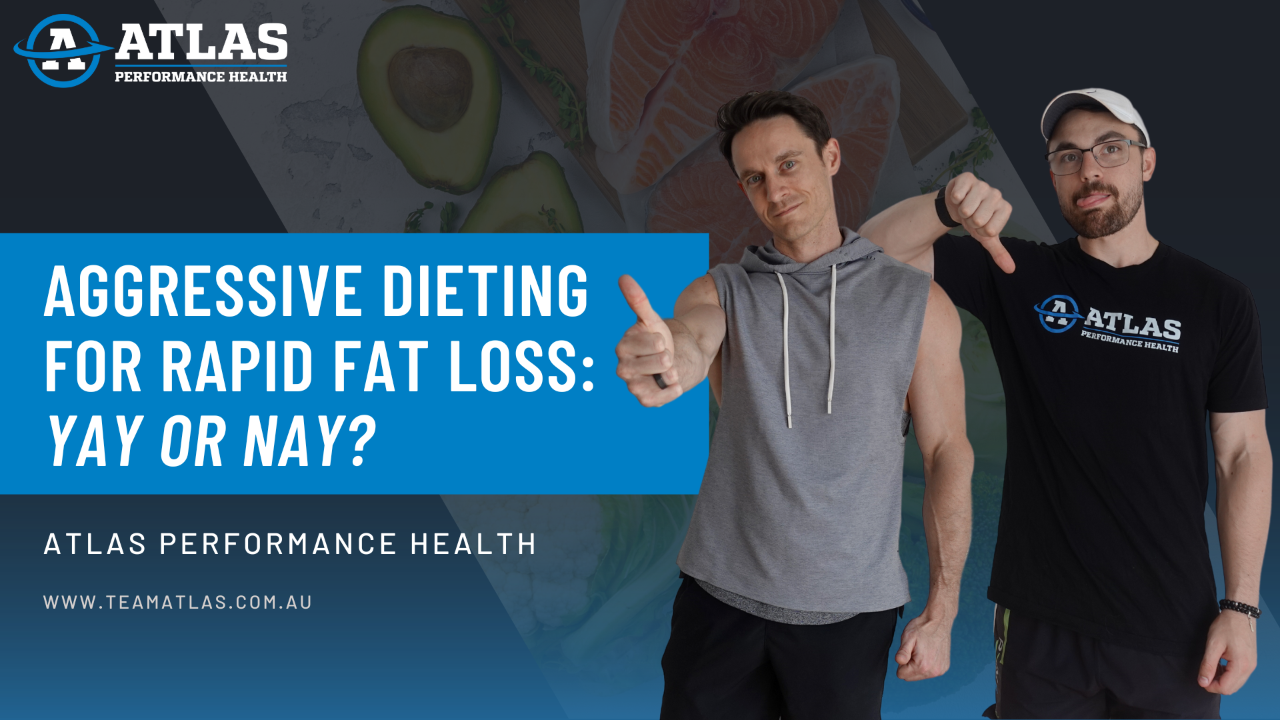
Aggressive Dieting for Rapid Fat Loss – Yay or Nay?
Mar 01, 2023Have you ever considered trying to lose more body fat faster when you diet?
If so, you’ve likely heard the term “aggressive fat loss” which aims to achieve rapid fat loss and accelerate the outcome. Often this term is associated with negative connotations attached to it and you’re perceived as crazy if you try to do it!
But what actually is aggressive dieting and rapid fat loss?
Recently we received a message from a lady who was alarmed that her friend had been given an “aggressive diet” and was put straight to 1800 calories a day to lose body fat. This is despite her friend having been more recently eating in a surplus of 2700 calories per day prior to her fat loss phase as she pursued muscle gain.
Whilst initially this may seem like a big calorie drop, if we dig a little deeper, is it really that aggressive?
Whilst we didn’t have access to all of the info in this situation, if we make a few educated guestimations, we’ll assume her friend was likely consuming around a potential a 5 - 10 % calorie surplus. Though as we don’t know her weight, activity levels and rates of gain we of course can’t be sure.
This would mean that her rough maintenance calories were potentially somewhere closer to 2400 - 2500 calories per day, which in turn, would mean that the deficit calories she was prescribed initially (1800) would've actually only been around a 600 - 700 calorie deficit, or roughly a 25% deficit.
However, a 25% predicted calories deficit is NOT aggressive dieting.
25% is more of a moderate calorie deficit and often quite ideal initially for many people. Why? Because it allows a solid rate of fat loss to be achieved with less negative ramifications too versus a much larger energy deficit.
This is why context is always so important when it comes to dieting, especially as it can be an emotional pursuit for many people. This is why we always need to take a step back and view things through an objective, case by case lens.
Yet this always much harder to do when you’re coaching yourself through the process, rather than being prescribed dieting protocols from an Online Coach like us, or via a Personal Trainer or Nutritionist.
So, let’s focus harder on context when it comes to dieting as it’s very important. Too often many people make a key error whereby they compare their dieting protocols and absolute rates of fat loss to another person’s. Doing this is ill advised for many reasons but especially because different humans should lose at different absolute rates.
This is because a larger human (e.g., 100kg male) has more weight to lose, so they can more easily achieve a higher absolute rate versus a much smaller human (e.g., a 50kg female). Yet their percentage rates of loss on average could be identical! For instance, both may have lost 1% total bodyweight per week, yet lost very different absolute amounts on the scale.
To illustrate this, when our coach Jack underwent a mini cut in 2022 as shown below, he lost 7kg in 7-weeks!
Yet he was met with questions of "don't you think that's too aggressive" and "are you insane?!"

However, crucially Jack’s starting bodyweight was 94kg and he entered the mini cut after almost 1 year in a calorie surplus due to his muscle building goal. For Jack, losing at a rate of 1% bodyweight per week would equate to ~ 0.94kg per week. Crucially, this amount falls within the evidence-based recommendations for dieting rates of loss per week.
Yet, if our coach Kimmy who weighs 54kg was losing at an absolute rate of 0.94kg, that would be a wildly different scenario. For a smaller human like Kimmy, these rates of loss would bring with it a whole bunch of negative trade-offs too, plus fall outside of the evidence-based recommendations.
However, for someone like our Head Coach Glen Carroll who weighs 75kg, losing at the same absolute rate as Jack would typically be ill advised and harder to consistently do over time due to his contextually lighter bodyweight.
Yet, when it comes to mini cut dieting, Glen personally prefers a more aggressive approach for himself. Why?
Because he loves food, is more impatient and hates dieting himself! So, when he does opt for a mini cut, often he’ll opt for a brief yet aggressive mini cut, which allows him to lose more body fat rapidly. He just wants to get in and get out really!
To illustrate this, below you can see the outcome of Glen’s 2-week mini cut and aggressive fat loss diet from 2019, which he performed after a holiday.

So, what would we class as aggressive dieting?
Well, if you're shooting for a predicted calorie deficit closer to the 35 - 40% zone, then now we’re starting to get into the more aggressive territory!
Whilst this is theoretically doable and should result in faster fat loss, more aggressive protocols will typically be harder to consistently adhere to over time. So, whilst rapid fat loss may sound good in theory, eventually you’ll feel the trade-off of these harsher protocols, which is why adherence is likely to be harder.
Plus, more aggressive dieting protocols used over a longer period, may actually have an unintended outcome too… By this we mean that harsher dieting protocols may negatively impact your ability to better preserve lean body mass, relative to less aggressive dieting protocols.
So, your ability to retain muscle may be inferior with aggressive dieting, especially if you’re a contextually leaner human!
Now, if we return to our original example featuring the woman on “aggressive” dieting protocols, do we really think a 25% deficit and drop to 1800 calories is that extreme? No!
Yet, if we calculated that her maintenance intake was ~ 2500 calories and aimed for a predicted 40% deficit, this would require a 1000 calorie decrease, bringing her daily intake to 1500 calories per day. This would be a more aggressive dieting approach!
However, whether this is ideal for her would still be unclear and impacted by numerous other factors. Yet, you can still diet more aggressively and achieve success if you do key things too. So, you want to consume sufficient dietary protein, resistance train, prioritise recovery and stress management, plus only diet like this for an appropriate duration and at the right time.
Ultimately your daily calorie intake when dieting is never going to be as enjoyable as your norm, but it’s important to factor in your preferences, needs and context when creating the right strategy to maximise your fat loss outcome.
Plus remember, you can get more aggressive too by manipulating the other side of the energy balance equation! By this we mean you can alter your energy output in conjunction with your energy input.
So, when considering what is aggressive our advice is to first think about the context and try to not compare your needs to another’s. Consider the pros and cons of a faster versus slower approach, plus match the protocols used to your goal, needs and time frames.
Thanks for reading,
Team Atlas

